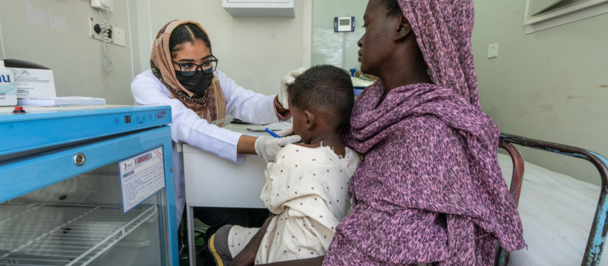Empowering rural communities toward resilience in Iraq
May 30, 2023

Salah al-Din Governorate lies in the center of Iraq, north of Baghdad, with a significant portion of residents engaged in agricultural activities. Radasa, 43, was born and raised in the rural area of Al Shirqaat, Salah al-Din. She is one of 30 beneficiaries who received both livelihoods and psychosocial support from UNDP and one of a handful of women who chose to receive training and support with cattle keeping and breeding.
Radasa completed the sixth level of primary school before marrying. After the birth of her ten children, including seven daughters and three sons, her husband succumbed to renal failure. Prior to his sickness, her husband was a contracted security guard.
“I wanted to be a teacher, but I got married,” she explains. “Now, I am the sole provider for my family.”
To provide for her children, Radasa works long hours on a nearby farm.
“I go at 4am to the farm to work and return home at 11pm. We make 6,000 Iraqi dinar per day trimming the fields and planting crops like okra (about $4 USD).”
Following Mental Health and Psychosocial Support (MHPSS) sessions and vocational training, Radasa received one cow and a small ox. She plans to use the cow to produce milk for her family and to sell to community members.
Despite the hard labor, Radasa is determined to set an example for other working women.
“I advise every woman to work on a farm, in a factory, anywhere she can to support her family. I advise them to continue to try to succeed in life,”
Through training sessions and meetings held by local partner Foundation of United for Relief and Sustainable Development (FUAD), Radasa and other women beneficiaries were brought together.
“All of these women are my friends. We advise each other and encourage each other.”
As a part of the project, and in the community in general, families who are perceived to affiliated with ISIL are receiving support to reintegrate in Al Shirqaat. Radasa has no qualms in welcoming these families as her neighbors.
“I have no problem with the perceived isil-affiliated families returning. They don’t hurt me. I have no issue with them, and they have no issue with me.”
Community acceptance for reintegration is a key component of UNDP’s work across the liberated governorates of Anbar, Ninewa, and Salah al-Din. Providing durable solutions including livelihood training and opportunities and MHPSS is critical to ensure resilience and a strong social fabric among communities. For breadwinners like Radasa, there is no option but to find ways to provide and take advantage of every possible opportunity.
“I have to be strong,” says Radasa. “I have daughters.”
“I want my boys to be teachers or government officers. I want my girls to be doctors. They watch me constantly. I work hard to shield them from everything I am going through.”
Occupied by ISIL from 2014 to 2016, before liberation, many families from Al Shirqaat District in Salah al-Din fled their homes and became displaced. During the struggle to re-claim the area, destruction left vital infrastructure damaged, increasing vulnerability and social distress.
To ensure sustainable solutions for community resiliency, UNDP and local partner FUAD have provided MHPSS and vocational training on cattle and sheep breeding, shopkeeping, and baking for community members. Following the training, small grants were awarded to participants to assist with developing their businesses.
Support for Social Cohesion in Iraq is a five-year programme launched in January 2020 to promote stronger, peaceful and more cohesive communities in all areas of Iraq.

 Locations
Locations



